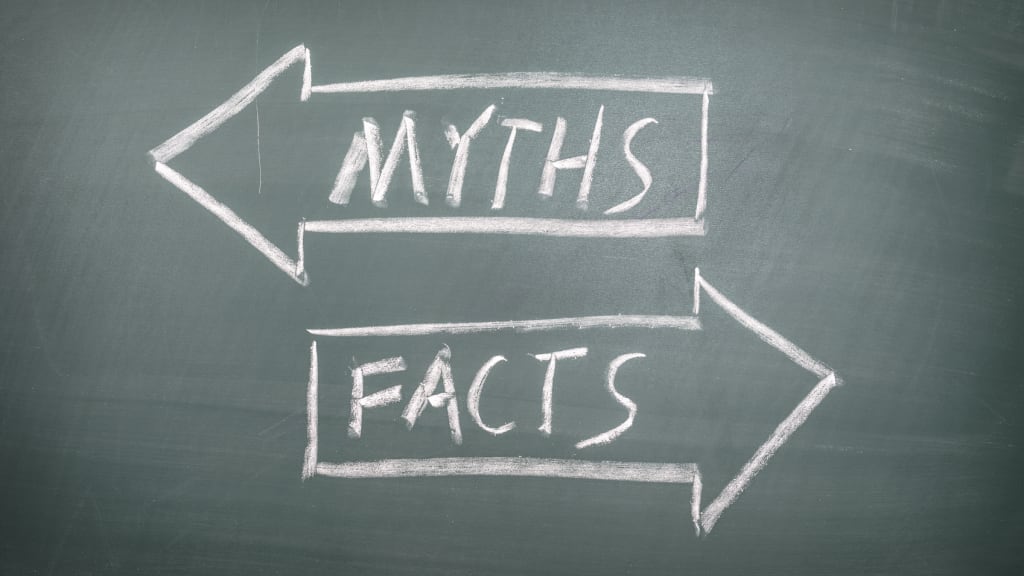5 Myths About Mental Illnesses
Separating Some Fact from Fiction

Mental illnesses come in all shapes and sizes. Since there are so many mental disorders, there is also tons of misinformation that gets circulated throughout our society. Have you ever heard anyone say, “I’m so O.C.D!”? Well, this my friends, is incorrect. Not only is obsessive compulsive disorder (O.C.D) not an adjective, it’s also not synonymous with “being neat.” There are plenty of other misconceptions about other mental illnesses floating around our societal consciousness and I am here to dispel a few.
1. “It’s all in your head.”
This popular myth is quite often perpetuated regarding depression and anxiety. While, physically and technically speaking, mental illnesses to occur within the brain, they are not something that can be simply pushed out of our minds. People who suffer from depression and anxiety often have a hard time controlling their thoughts and emotions daily, so much so that they may have to seek the help of anti-depressants or anti-anxiety medications. Also, research has shown that many mental illnesses and psychiatric disorders have to do with chemical imbalances in the brain.
Telling someone to just, “get over it” is like telling someone with a broken foot to just use their magical thinking powers to mend the broken bone. It’s factually inaccurate and condescending to say someone’s mental illness is “all in their head.”
2. Bipolar Disorder = Split Personality
It’s my understanding that this myth comes from the “bi” in bipolar. The prefix “bi” often means “two.” Example: “biannually” means “twice per year.” This simple misunderstanding of words and definitions, has led some to interpret the “bi” in bipolar disorder as a “split” in personality. A person with multiple personalities would have dissociative identity disorder, not bipolar disorder.
Bipolar disorder is defined as a disorder marked by periods of elation and depression. There are four types of bipolar disorder which can be differentiated between by the severity and duration of the “high” and “low” episodes.
From here:
- Bipolar I Disorder—defined by manic episodes that last at least 7 days, or by manic symptoms that are so severe that the person needs immediate hospital care. Usually, depressive episodes occur as well, typically lasting at least 2 weeks. Episodes of depression with mixed features (having depression and manic symptoms at the same time) are also possible.
- Bipolar II Disorder—defined by a pattern of depressive episodes and hypomanic episodes, but not the full-blown manic episodes described above.
- Cyclothymic Disorder (also called cyclothymia)—defined by numerous periods of hypomanic symptoms as well numerous periods of depressive symptoms lasting for at least 2 years (1 year in children and adolescents). However, the symptoms do not meet the diagnostic requirements for a hypomanic episode and a depressive episode.
- Other Specified and Unspecified Bipolar and Related Disorders— defined by bipolar disorder symptoms that do not match the three categories listed above.
Dissociative identity disorder, however, is defined as a rare disorder characterized by two or more distinct personality identities or “alters.” D.I.D is typically formed in childhood as a response and defense mechanism to severe trauma. D.I.D is also categorized as a dissociative disorder while bipolar disorder is considered a mood disorder.
That’s not to say that those with D.I.D can’t also have a type of bipolar disorder. It’s not unheard of for the host or one of the altered states of consciousness within a person suffering from D.I.D to also suffer from other mental illnesses. Although, having one doesn’t mean having the other is inevitable.
3. Bipolar Disorder vs. Borderline Personality Disorder
Borderline personality disorder and bipolar disorder are known to share some symptoms with each other like recklessness and intense mood swings which makes it difficult to diagnose either but luckily, there are some differentiating factors that have been noted by experts.
Borderline personality sufferers tend to endure their symptoms consistently while bipolar disorder sufferers sometimes have “breaks” in their extreme mood swings. Also, it has been noted that BPD sufferers may trigger their disorder with conflict between interpersonal relationships while bipolar patients’ symptoms come seemingly from nowhere.
4. Hypochondriasis Vs. Munchausen Syndrome
The disorder hypochondriasis and Munchausen syndrome are often conflated with one another. While both are disorders related to health, they certainly aren’t the same thing.
Hypochondriasis or health anxiety, is a disorder in which an individual experiences great fear and anxiety that they have a serious condition. Sufferers are likely to visit doctors frequently for minor symptoms. A hypochondriac believes whole-heartedly that what they are experiencing is real, sometimes, even if a doctor gives a clear bill of health. The disorder usually forms in adulthood and can range from severity. It can be caused by loss of a loved one, especially if the loved one died of disease.
Munchausen syndrome is a factitious disorder, a mental disorder in which a person acts as if they are sick, mentally or physically, when they are not. People with Munchausen syndrome will deliberately produce or exaggerate symptoms. Though they may lie or fake symptoms, they may also manipulate test results or even hurt themselves to ensure injury.
Munchausen by proxy is the same disorder only a caregiver with Munchausen makes up symptoms and ailments for a person in their care.
The difference between Munchausen syndrome and hypochondria is that those with Munchausen syndrome are intentionally lying and are aware that the illness is false, where as those with hypochondria are convinced of their ailments.
5. Schizophrenia = Multiple Personalities
Since we have already gone over D.I.D (multiple personality disorder), I won’t go over what it is. I will, however, tell you that schizophrenia doesn’t equate to having multiple personalities.
Schizophrenia can come with a multitude of symptoms, but multiple personalities isn’t one. According to Psychology Today: “This myth likely originated because the word “schizo” means split—however, in this case, it refers to gaps (or a splitting) in a person’s ability to think and express emotions.”
Schizophrenia is defined as a severe mental disorder that affects how a person thinks, feels and behaves. It can be very debilitating, and sufferers can seem as if they have lost touch with reality.
It’s important to separate facts about mental illnesses and their fictitious counterparts that are frequently perpetuated in our media and culture today. Continuing to spread misinformation about mental health is detrimental to breaking the stigma surrounding it today. If you or someone you know is suffering from mental illness, please seek help or encourage others to do so.
About the Creator
Sarah Fennell
Author, mother, and terrible at describing herself.
Sayruhlong.wordpress.com
@say__ruhh on Twitter
say.ruh on Snapchat






Comments
There are no comments for this story
Be the first to respond and start the conversation.